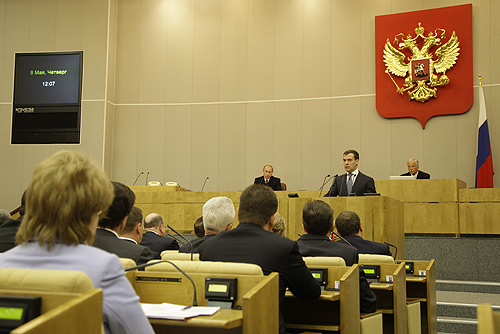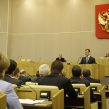
Medvedev Highlights Possible Zastoi as Political System Decays
Publication: Eurasia Daily Monitor Volume: 7 Issue: 212
By:

On November 30, President Dmitry Medvedev will deliver his annual address to parliament in a highly ritualized ceremony solemnly demonstrating loyalty and obedience to the “boss.” The triple irony of this event is in the non-existent personal loyalty to the junior member of the ruling duumvirate among the political elite, in Medvedev’s too obvious disbelief in his own leadership, and in the delay due to which the address that is supposed to set priorities for the year ahead is delivered so late that even the budget for 2011 has been finalized and approved (Nezavisimaya Gazeta, November 12; www.gazeta.ru, November 10). The political class, therefore, is largely indifferent to the still secret “marching orders” and only mildly curious about the words that Medvedev will invent to hide the fact that he has nothing to say.
The only real news that Medvedev could –and clearly wants to– break is the announcement that he would pursue a second presidential term in spring 2012, but Prime Minister, Vladimir Putin, has just confirmed that the duo has not yet held the long-promised heart-to-heart talk about the election (RIA Novosti, November 26). Medvedev cannot fail to see that his “modernization” discourse has exhausted itself without making any impression on the self-serving bureaucracy, so he tries to add a new spin in order to simulate movement in the “Go, Russia!” direction (Kommersant-Vlast, November 22). The latest entry in the presidential blog has attracted more than the usual superficial attention because Medvedev verbalized unusually sharp criticism: “It is no secret that for some time now signs of stagnation have begun to appear in our political life and stability has threatened to turn into stagnation.”
Medvedev did not repeat the point about the ruling party turning into a “supplement to executive power” the next day in his meeting with the leaders of the four parliamentary parties, merely asking about their preferences for the content of the address (Kommersant, Vremya Novostei, November 25). Medvedev’s message, nevertheless, has prompted such semi-insiders as Gleb Pavlovsky to speculate that the president is applying pressure on the ruling elites that have lost the trust of the electorate due to their shameless harvesting of various administrative rents (Vzglyad, November 25). The sharpest comment appeared in the same Gazeta.ru where Medvedev published his manifesto last year, and now Natalya Gevorkyan argues that he has dared to use the loaded term “zastoi” when the situation in the country has deteriorated far beyond the comfortable stagnation that suited both the rulers and the masses (www.gazeta.ru, November 25).
Indeed, signs of breakdown of various kinds appear in the official “life-is-good” picture every day, and one of the most gruesome was the murder of 12 people, including four children, in Kushchevskaya, Krasnodarsky krai, three weeks ago. The investigation has revealed that bandits effectively took control of this village with a population of 30,000 and terrorized it under the protection of the local police (Ezhednevny Zhurnal, November 26). Governor Aleksandr Tkachev admitted that the situation of lawlessness lasted for years and was typical for many places, and several journalistic accounts revealed widespread inter-penetration of criminal networks, law enforcement agencies and regional authorities (Moskovsky Komsomolets, November 27). This shocking picture of the criminalization of executive power in a prosperous and stable region, which will host the Winter Olympics in 2014, destroys Medvedev’s argument that reforms could only be gradual to avoid the “paralysis of democratic institutions” – those are already in progressive decomposition.
What constitutes a life-support system for political zastoi is the steady inflow of petro-rubles, and Putin works relentlessly at locking the European markets for Russian gas. Last week, Putin was in Berlin lashing out passionately against the so-called “third energy package” approved by the European Commission, which in his opinion, denies Gazprom the right to use the infrastructure it has built (Kommersant, November 27). German Chancellor, Angela Merkel, expressed mild skepticism about Putin’s big idea of building an integrated Russian-European energy complex, and the provisional decision of the German energy giant E.ON to sell its 3.5 percent shares in Gazprom reflects this changing attitude to doing energy business with Russia (Vremya Novostei, November 26; Nezavisimaya Gazeta, November 25). Russia made Ukraine pay for these troubles: last week President Viktor Yanukovych did not receive any cuts on gas prices and can only put before his cabinet the same rhetorical question that Putin asked in Berlin: “Now, if this is not robbery, what is it?” (Kommersant, November 27).
The fears in the Russian elites about a new fall in oil prices have largely dissipated, but the plain fact is that the expected revenues are not sufficient for ensuring a “deep satisfaction” in society in the year when the political system has to undergo a sensitive reformatting (www.gazeta.ru, November 24). Putin can brag about 4 percent GDP growth, but statistics show two worrisome trends: real income has started to shrink, and the outflow of capital has accelerated to $21 billion (Nezavisimaya Gazeta, November 24; www.newsru.com, November 23). The second trend signifies more than the lack of incentives to invest in the domestic market –it shows that Russian big business seeks to hedge against political risks. The first one is set to deepen in 2011, with the scheduled increases in communal tariffs and taxes, so that only pensioners will still count on Putin’s generosity.
Medvedev probably feels better than Putin that the effectiveness of TV propaganda is diminishing with the advance of the Internet, but he cannot connect with the no-nonsense political life of the blogosphere, which may be virtual but is far closer to reality than the official stability-simulating discourse. The address Medvedev will deliver on November 30 is his last chance to sell himself to the ruling elite as a sensible modernizer who could prolong the life-span of the crumbling system for a few more years with cautious reforms and intelligent appeal to the disgruntled public. The message is not without merit but the messenger is so clearly unfit for the role of decision-maker that Putin’s plain proposition of zastoi-is-good has a far better chance to win the day.




